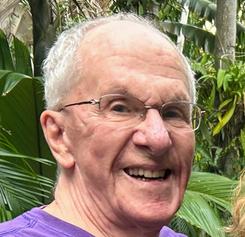David Tenney, co-founder of Kramerbooks (now Kramers), Washington, D.C., died on January 31 at the age of 80.
 |
|
| David Tenney | |
In 1976, with Bill Kramer and Henry Posner, he founded Kramerbooks, located just north of DuPont Circle, which grew from a small independent bookstore into what an obituary called "an iconic landmark gathering place for book lovers, intellectuals, creatives, politicians, and celebrities." The store stocked an extensive collection of books and featured a popular café, Afterwords, which became a model for other bookstores that wanted to provide places for customers to lounge and read. For a time, the store was open 24 hours a day. In 1998, Kramerbooks successfully fought a subpoena from Kenneth Starr during the Clinton investigation, seeking records of book purchases by Monica Lewinsky. In 2016, Tenney and Kramer sold the store to Steve Salis, founder of &pizza, with Tenney remaining as minority owner. The following year, Tenney sold his interest.
Tenney was known for his "unwavering commitment to creating a space where people could not only buy books, but also engage in lively discussions, attend author readings, and enjoy good food in a warm, inclusive environment," his obituary noted. "David was a passionate reader and prided himself on his ability to advise and recommend books to his very diverse clientele. Though he insisted that his bookstore was 'serious' (it had an exceptionally broad inventory), his demeanor was always upbeat with a wry, irreverent, and iconoclastic humor...
"David's dedication to independent bookstores and his belief in the importance of local businesses helped preserve a sense of individuality in a world increasingly dominated by chain retailers. His leadership and vision kept the store thriving even in the face of challenges posed by the rise of online shopping.
"Tenney was also known for his generosity and commitment to his community. He will always be remembered for his support for local authors, his involvement in literary events, and his love for fostering intellectual dialogue. He built meaningful relationships with both customers and employees, many of whom considered him a mentor and friend."

